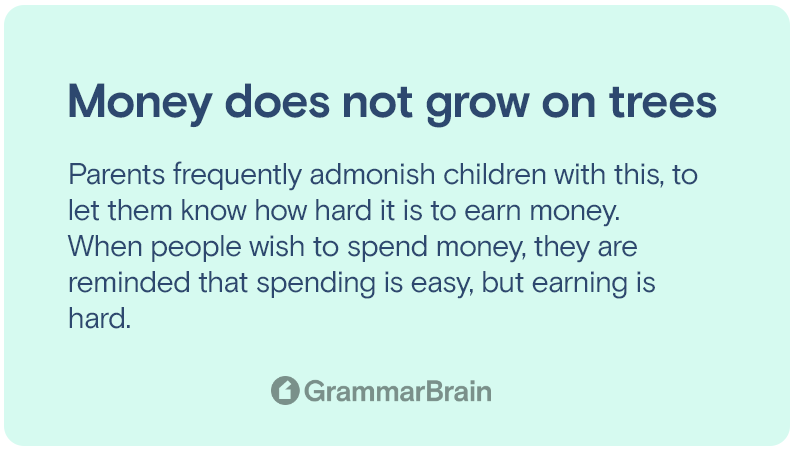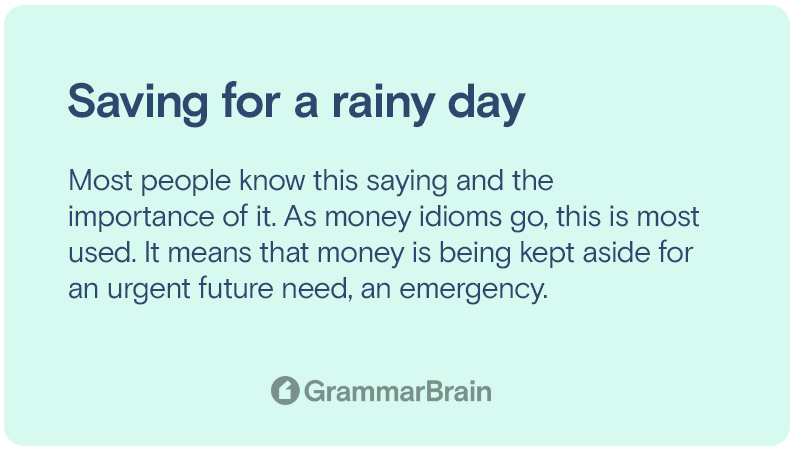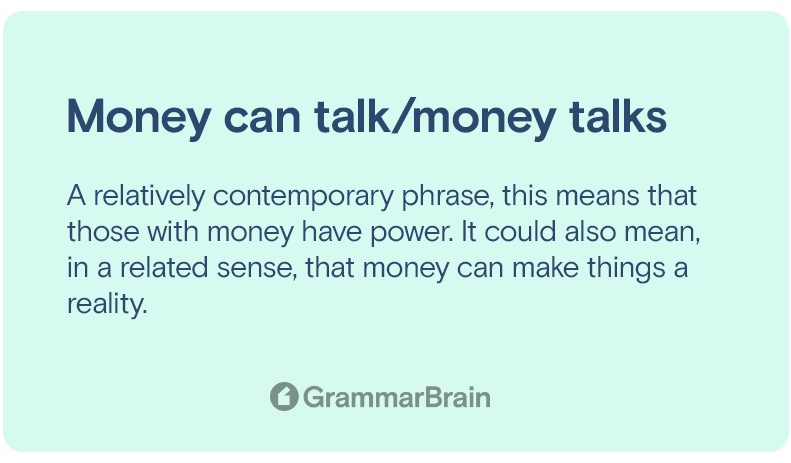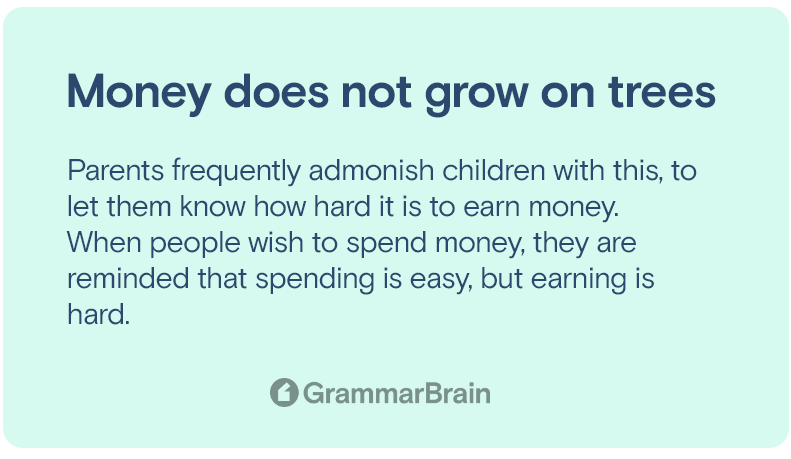Idioms are as common to the English language as are punctuation marks. Nonetheless, not many people use them as effectively, as they are not educated in their use. An idiom is a phrase used to imply meaning and convey a message efficiently. An idiom, in English, is also commonly known as an “idiomatic expression”. There are words and phrases used as idioms based on a multitude of subjects.
Consequently, there are idioms that range from “money idioms” to those about food.

What are idioms?
In the plainest of terms, an idiom refers to a phrase/sentence that, when spoken or written as a complete word set, has a meaning. These are often termed “sayings” or even “proverbs” in English.
The important thing to note about an idiom is that if the words that it represents were to be segregated, they would mean nothing.
Consequently, the words of an idiom, standing as individual words, have no meaning unless in the context of the idiomatic expression.

For instance, the idiom, “no smoke without fire” has nothing to do with something actually burning. It simply means that every effect has a cause that justifies it.
There are idioms that involve a wide variety of topics, like money idioms to idioms that have to do with birds. Nonetheless, they have meanings that are completely different to the literal words they comprise. By using an idiom, any message can be effectively communicated with grammatical flair.
What are “money” idioms?
Once the concept of an idiom is clear, knowledge of several idioms is necessary to familiarize yourself with the subject. Money idioms have the connotation of “money” involved in them, so there is some implication of a monetary nature. Idioms about money could be about the fact of having money or of spending money.

In some instances, money idioms could well be about advice on how to save money “for a rainy day”, for example. In case individuals aim for fluency concerning money, money idioms can help immensely. An idiom about money, spoken or written in the proper context, can be pretty impressive regarding messages sent.
Idioms about money (and their meanings)
An idiom can be a helpful tool when speaking and writing in English. As a phrase, it can literally “hit the nail on the head” and give the true meaning of what the writer/speaker is trying to communicate.
Knowing some of the “money idioms” and what they mean can help to convey messages in a better way than by using regular words and phrases. Each idiom in the list below has a specific meaning:

The best things in life are free
There is a saying that is similar to this, and it goes like money is not everything, or money cannot buy happiness. This is among the commonest idioms used in English today.
Plainly put, it means that the most important things in life, like certain emotions (love, happiness, etc.), cannot be bought with money.
Other things in life, considered important for wellbeing, like health and friendship, cannot be purchased either.

A fool and his money are soon parted
This is among the most favored money idioms, essentially meaning that foolish people lose their money. It refers to the fact that some individuals are smart regarding money, while others are not.
Early to bed, early to rise, makes a person healthy, wealthy, and wise
Not an idiom that pertains to money alone, this popular saying coined by Benjamin Franklin means a lot. The meaning refers to the fact that a person can be healthy, wealthy and wise if they sleep on time and wake early.
Money can talk/money talks
A relatively contemporary phrase, this means that those with money have power. It could also mean, in a related sense, that money can make things a reality.
Another common term used to imply the same among money idioms is money makes the world go around.
In for a penny, in for a pound
An old saying, it means that if you begin something, you must end it. Even if something started seems like it cannot be finished, it must not be left incomplete.
In other words, the utmost effort may be required to conclude a task.
Examples
Here are some examples of how the key idioms about money are used in sentences. Each idiom has a meaning that relates to the context:
The best things in life are free
The thing to do that she liked most was walking in the park with her grandmother. The best things in life are free!
Money can’t buy happiness
The millionaire lost his wife in a tragic car crash. Just shows that money cannot buy happiness.
A fool and his money are soon parted
Rob was born rich, but he lost all his money betting on the wrong horses. You can see that a fool and his money are soon parted.
In for a penny, in for a pound
Lina got a commission to paint a portrait but had to finish it within a week. She knew it would be an impossible task given that she had to care for her sick mother, but she was in for a penny, in for a pound.
Money really talks
Everyone worships him wherever he goes. Money really talks.

Money idioms about saving money (and their meanings)
Several people often use an idiom to indicate how to save money or to convey that saving money is advantageous. Here are some key money idioms of how to save money with meanings shown:
Money does not grow on trees
Parents frequently admonish children with this, to let them know how hard it is to earn money. When people wish to spend money, they are reminded that spending is easy, but earning is hard.
A penny saved is a penny earned
What this indicates is that the prevention of money being spent resembles earning it. If money is not spent, it will still be your earnings as it will remain with you.
Saving for a rainy day
Most people know this saying and the importance of it. As money idioms go, this is most used. It means that money is being kept aside for an urgent future need, an emergency.
Tighten your purse strings
This mainly means to keep your purse shut and spend less.
Money is the root of evil
Another well-known saying, this means that money cannot buy happiness and often results in negative circumstances for people who have it.
Examples
Here are some examples of idioms about saving money used in sentences:
Tighten your purse strings
If you want to own your own home one day, you had better tighten your purse strings now.
Save up for a rainy day
I won’t spend a lot of my wealth just now, as I wish to save up for a rainy day.
Money didn’t grow on trees
The boy begged his mother to buy him the expensive toy train, but she told him that money didn’t grow on trees.
Money is the root of all evil
Greed made him wealthy, but his bad habits turned all his true friends away. Money is actually the root of all evil.
Money Idioms
Idioms are crucial parts of any language and are used frequently. It is important to study their appropriate use as they deliver meanings and make speaking and writing more interesting.
References:
- 101 Money Idioms And Phrases (Meaning & Examples) (englishbyday.com)
- 7 Money Idioms That You Are Probably Confused About | Grammarly
- 20 Money Idioms Explained to ESL Students – Owlcation
- 20+ Interesting Money Idioms in English – ESL Forums
- 23 Money idioms (with definitions & examples) (improving-your-english.com)
- Examples of Idioms About Money (yourdictionary.com)
- Money Sayings Explained – OppU (opploans.com)
Inside this article
Fact checked:
Content is rigorously reviewed by a team of qualified and experienced fact checkers. Fact checkers review articles for factual accuracy, relevance, and timeliness. Learn more.
Core lessons
Glossary
- Abstract Noun
- Accusative Case
- Anecdote
- Antonym
- Active Sentence
- Adverb
- Adjective
- Allegory
- Alliteration
- Adjective Clause
- Adjective Phrase
- Ampersand
- Anastrophe
- Adverbial Clause
- Appositive Phrase
- Clause
- Compound Adjective
- Complex Sentence
- Compound Words
- Compound Predicate
- Common Noun
- Comparative Adjective
- Comparative and Superlative
- Compound Noun
- Compound Subject
- Compound Sentence
- Copular Verb
- Collective Noun
- Colloquialism
- Conciseness
- Consonance
- Conditional
- Concrete Noun
- Conjunction
- Conjugation
- Conditional Sentence
- Comma Splice
- Correlative Conjunction
- Coordinating Conjunction
- Coordinate Adjective
- Cumulative Adjective
- Dative Case
- Determiner
- Declarative Sentence
- Declarative Statement
- Direct Object Pronoun
- Direct Object
- Diction
- Diphthong
- Dangling Modifier
- Demonstrative Pronoun
- Demonstrative Adjective
- Direct Characterization
- Definite Article
- Doublespeak
- False Dilemma Fallacy
- Future Perfect Progressive
- Future Simple
- Future Perfect Continuous
- Future Perfect
- First Conditional
- Irregular Adjective
- Irregular Verb
- Imperative Sentence
- Indefinite Article
- Intransitive Verb
- Introductory Phrase
- Indefinite Pronoun
- Indirect Characterization
- Interrogative Sentence
- Intensive Pronoun
- Inanimate Object
- Indefinite Tense
- Infinitive Phrase
- Interjection
- Intensifier
- Infinitive
- Indicative Mood
- Participle
- Parallelism
- Prepositional Phrase
- Past Simple Tense
- Past Continuous Tense
- Past Perfect Tense
- Past Progressive Tense
- Present Simple Tense
- Present Perfect Tense
- Personal Pronoun
- Personification
- Persuasive Writing
- Parallel Structure
- Phrasal Verb
- Predicate Adjective
- Predicate Nominative
- Phonetic Language
- Plural Noun
- Punctuation
- Punctuation Marks
- Preposition
- Preposition of Place
- Parts of Speech
- Possessive Adjective
- Possessive Determiner
- Possessive Case
- Possessive Noun
- Proper Adjective
- Proper Noun
- Present Participle
- Prefix
- Predicate



